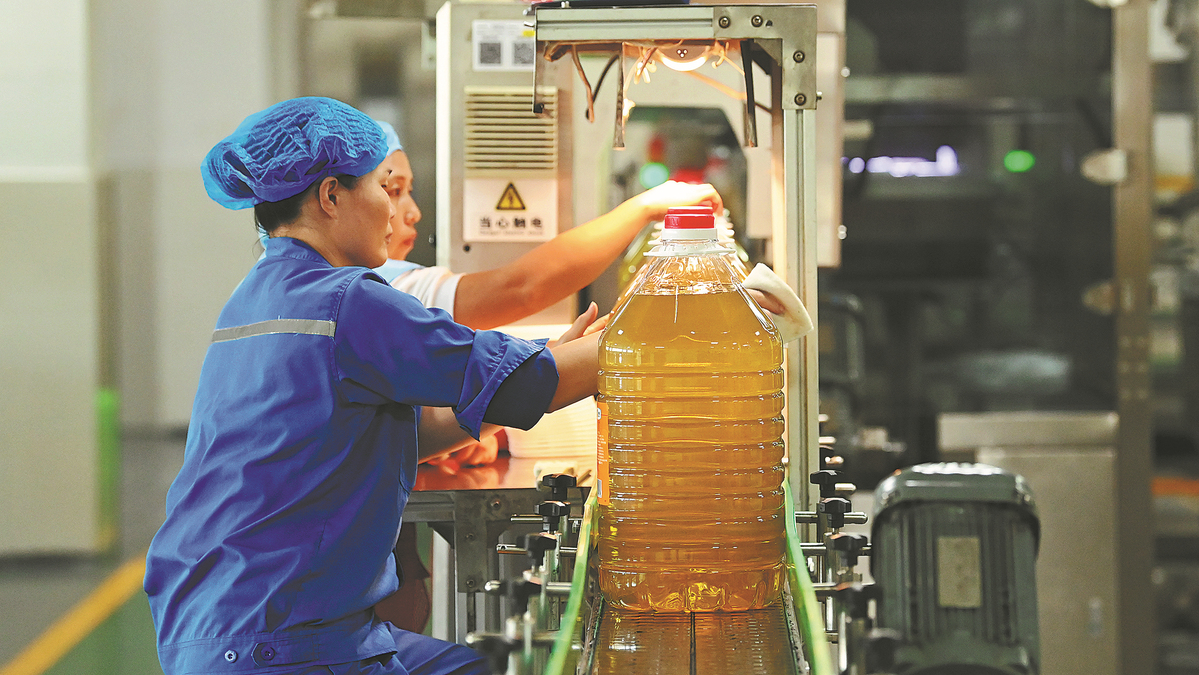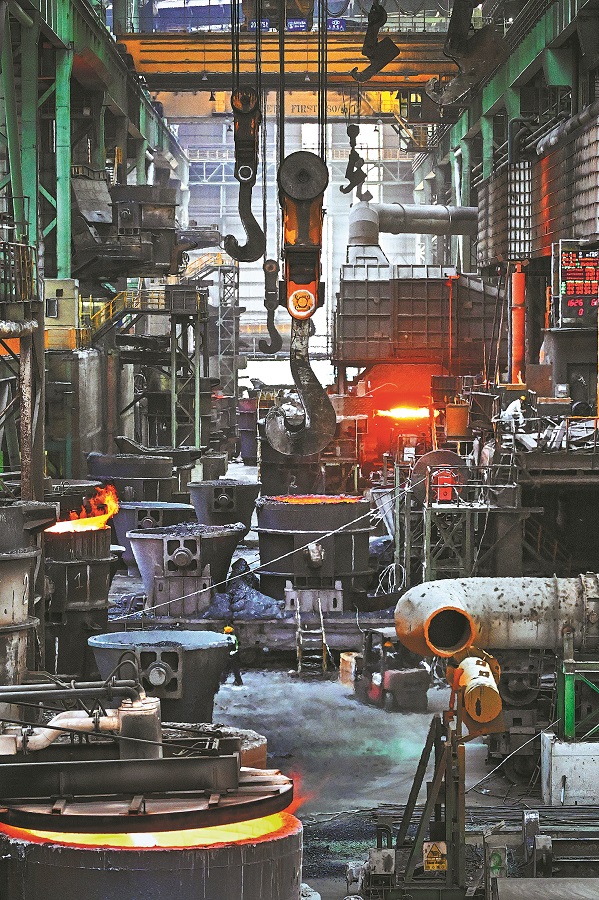Cultural similarities give companies confidence to pump money into nation

Mazlim Husin, chief commercial officer of Kuantan Port, has personally seen how Chinese investments have transformed Kuantan — the capital city of the state of Pahang, which is located on the east coast of Peninsular Malaysia.
For Mazlim, the Malaysia-China Kuantan Industrial Park, or MCKIP, has "changed the landscape of the whole industrial development in Kuantan".
The park opened in 2013 and is located in the East Coast Economic Region. It covers more than 14 square kilometers and caters to heavy, medium and light industries, and features both residential and commercial facilities.
Alliance Steel, one of the biggest steelmakers in Malaysia, is based in MCKIP. Mazlim said the company's presence in Kuantan not only encourages other companies to invest in the city, but also helps boost socioeconomic development in the community as it provides jobs and sources iron ore and other minerals from the local community.
"You can see a lot of improvement and changes around us now. (The investments) just bring people together, and we just want (Kuantan) to grow," Mazlim told China Daily.
The MCKIP and the China-Malaysia Qinzhou Industrial Park in Qinzhou, Guangxi Zhuang autonomous region, are part of the "Two Countries, Twin Parks" collaboration model between China and Malaysia. More important, this model is a concrete representation of how Chinese investments have grown in Malaysia and have helped strengthen economic ties between the two nations.
'Win-win scenario'
China is one of the largest sources of foreign investments for Malaysia. Last year, China invested 28.2 billion ringgit ($6.4 billion) in Malaysia, accounting for over 16 percent of Malaysia's 170.4 billion ringgit foreign investment revenue, according to the Malaysian Investment Development Authority, or MIDA. The amount is nearly double the 14.5 billion ringgit Chinese investors posted in 2023 and is expected to create over 20,000 new jobs.
Safwan Nizar Johari, acting investment consul for the Malaysian consulate in Guangzhou, Guangdong province, said that in the past few years, most Chinese investments have been in the EV, battery and related industries. He said the two countries celebrated the 50th anniversary of diplomatic relations in 2024, and this strong diplomatic relationship has made Chinese companies more confident about investing in Malaysia.
ALSO READ: Chinese investment in ASEAN expands to benefit both sides
Safwan said Malaysia implements business-friendly policies — including tax incentives, a 100 percent foreign equity ownership and long-term work visas for expatriates — that entice a lot of foreign investors. He said Malaysia is an "open and trading country".
Like China, Malaysia is a member of the Regional Comprehensive Economic Partnership, the world's biggest free trade pact. As a member of the Association of Southeast Asian Nations, Malaysia is also part of the ASEAN-China Free Trade Area.
Malaysia's multicultural population is also a huge draw for Chinese investors. Ethnic Chinese comprise about 20 percent of the Malaysian population — over 35 million people — and they can speak several languages, including Malay, Chinese and English.
"This contributes to the decision making of a Chinese company (in choosing an) investment destination in ASEAN," Safwan said.
"When they choose Malaysia, it feels like home. (It is) very comfortable for them to set up (a business) in Malaysia," he told XINHUA.

And with Malaysia as this year's ASEAN chair, Safwan said Malaysia is inviting Chinese and other foreign companies to invest in Malaysia as a gateway to ASEAN and beyond.
"The theme of ASEAN this year is inclusivity and sustainability. So this is really in line with our main goal to invite and attract foreign companies to come to our country to invest and make Malaysia a hub, not just to penetrate the local market, but also to export globally," Safwan said, adding that in enticing foreign investors, Malaysia doesn't believe in a zero-sum game.
"We believe in the win-win scenario. When they invest in Malaysia, we want to grow with the other ASEAN countries. This is why we want to make Malaysia a (regional) hub and expand beyond Malaysia," he said.
Daniel Chua, senior vice-president of GP Energy Tech International, a subsidiary of battery manufacturer Gold Peak Technology Group, concurs with Safwan.
Chua said Chinese companies feel "comfortable" investing in Malaysia thanks to cultural similarities, common language and the Malaysians' cordial relationship with Chinese investors and employees.
Gold Peak, a Hong Kong-listed company, has three manufacturing plants in the southern Malaysian state of Johor. On Feb 19, the company submitted a letter of intent to Invest Johor, the state government's principal investment promotion agency, to build a $150 million nickel-based battery manufacturing facility and research and development center in the Johor-Singapore Special Economic Zone, or JS-SEZ.
Chua said when Gold Peak invests in Malaysia, they introduce new technology, create jobs and contribute to regional development. The company employs locals for various positions, mostly in professional, managerial and executive capacities. The proposed plant in JS-SEZ, for example, is expected to create as many as 180 new jobs.
"This was actually the whole idea behind in terms of manpower and talent attraction," Chua said. "That's what we want to create for the local economy. At the same time, we try to find local suppliers."
READ MORE: Malaysia to deepen biz ties with China
Gold Peak is just one of many Chinese companies that have been investing in Malaysia — Southeast Asia's third-largest economy — over the past 20 years as part of their global expansion plans. Among the earliest investors are Huawei, which entered Malaysia in 2001, and ZTE, which arrived in 2004. To this day, Malaysia remains crucial in these two technology companies' international business operations.
Kuala Lumpur is home to Huawei's Asia-Pacific regional headquarters, global training center, global technical and solutions center and customer solution innovation center. On Feb 18, Huawei launched Mate XT, the world's first trifold smartphone, in Malaysia's capital city.
Malaysia's Minister of Investment, Trade and Industry Zafrul Aziz said 95 percent of ZTE's 5G equipment includes chips from Malaysia, proof of Malaysia's significance in ZTE's global operations. In a post published in December 2024 on his social media account X (formerly known as Twitter), Zafrul said ZTE is planning to invest 200 million ringgit in Malaysia to establish two innovation centers, and bring the latest 5G technology through collaboration with local operators.
Auto investors
Chinese investors are not confined to the technology space.
In 2015, the China Railway Rolling Stock Corporation opened its first overseas manufacturing base in the northwest Malaysian state of Perak. Located on a 20.2-hectare complex, the plant can manufacture up to 200 carriages per year and has also provided new jobs to the local community, with more than 80 percent of its total staff locally recruited.
In 2017, Hangzhou, Zhejiang province-based carmaker Geely Holding Group acquired a 49.9 percent stake in Malaysia's national car company Proton to transform it into the top car brand in Malaysia and one of the leading brands in ASEAN.
In December 2024, Geely and its partner Malaysian conglomerate DRB-HICOM signed a memorandum of understanding with MIDA to develop the Automotive Hi-Tech Valley in Tanjong Malim, Perak, to promote Malaysia as ASEAN's hub for electric vehicles. Two months after the MOU signing, Proton announced on Feb 7 that it had started construction on a new EV production plant in Tanjong Malim, according to local media reports. The 82 million-ringgit plant is expected to be completed by the end of this year and will produce several models, including the Proton e. MAS 7, the first EV car made by a Malaysian car company.
Chin Yew Sin, president of the Asia-Pacific Strategy Research Center, a Kuala Lumpur-based think tank, said China's investment in Malaysia represents "a closely tied partnership ingrained in cultural, economic and strategic advantages".
Chin said Chinese companies have capitalized on Malaysia's investment-friendly environment and multicultural society. In recent years, Chin said the diversification of global and regional supply chains and the adoption of the 'China+1'strategy have boosted the influx of investments to Malaysia and other ASEAN countries.
For Ian Yoong Kah Yin, a private equity investor and former investment banker in Malaysia, the main purpose for diversifying investments in Malaysia is to pursue the China +1 strategy, which calls for maintaining production in China while setting up additional facilities in other nations.
"Channel checks reveal that there are many Chinese companies that are expediting the setting up of manufacturing operations in Malaysia," he said.
Yoong welcomed these investments because the presence of Chinese companies has encouraged the transfer of skills and also serves as "role models to Malaysians in creating world-class businesses".
Xu Weiwei in Hong Kong and Xinhua News Agency contributed to this story.


